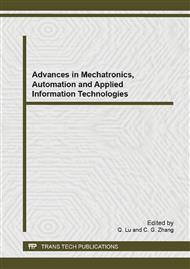p.3
p.9
p.13
p.18
p.22
p.26
p.30
p.34
The Knowledge in Artificial Intelligence
Abstract:
The objective of this work was to investigate the concept of knowledge in order to obtain useful for the techniques of artificial intelligence and knowledge representation. several definitions of knowledge proposed by various authors are analyzed, compared and graded, they are then merged into a new definition, which is partially formalized tools logical-algebraic, and finally, discusses the possible links with the areas of intelligence artificial intelligence and knowledge representation.
Info:
Periodical:
Pages:
9-12
DOI:
Citation:
Online since:
November 2013
Authors:
Price:
Сopyright:
© 2014 Trans Tech Publications Ltd. All Rights Reserved
Share:
Citation:


